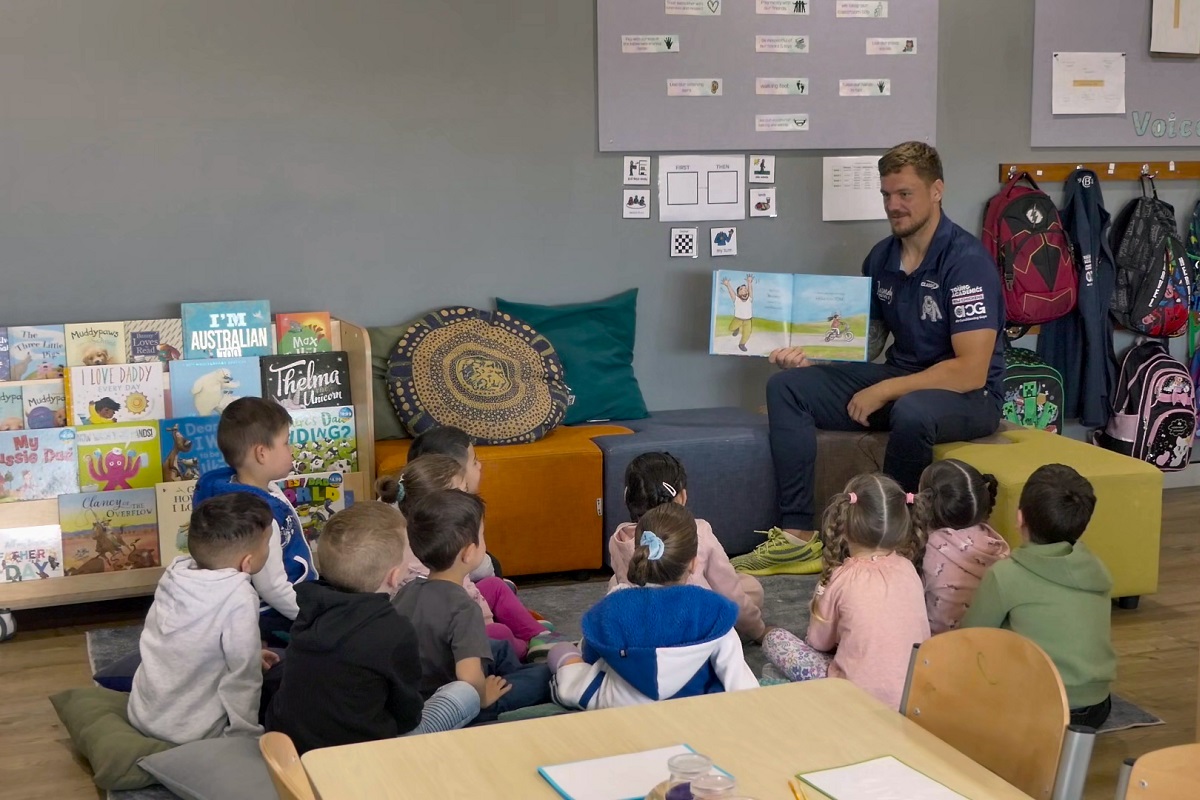Am I A Bad Mum podcast
Hosts: Katie Mattin, Rachel Thaiday
Guest: Michelle Theodosi, The Lifestyle Dietitian – YA’s nutrition partner
Host: Welcome Michelle. Today you’ve got some new hot topics for us all in regards to the nutrients we should be delivering for the healthy brain function of our children.
Michelle: Yes, it’s a broad topic, but something I’d like to explore today is how important nutrition is in brain function and development, particularly in children.
Host: It’s a big topic but one we probably don’t think of as parents. It wouldn’t be at the forefront of your mind, ‘hey, I’m going to make dinner tonight and it’s going to have x, y, z in it because of brain development’, so it will be great to learn some tips we can implement.
Michelle: Brain development and brain function really play a critical role in everything from concentration and focus in children to mood, irritability and their overall cognitive function and performance.
So, if your child is having difficulty focusing or big shifts in their mood, then as a parent you are dealing with that multiple times every day. But what we can control is what we’re delivering our children through their nutrition.
Host: It’s interesting, because I implemented a no screen, no sugar in the evening thing, it’s something, you know, when kids drive you crazy and you try to find a solution, that was my solution in the evening when I found they were being over stimulated, argumentative, and not doing what I needed them to – getting ready for bed, having showers, they were too distracted. Now obviously screens is a different topic, but back to sugar. My kids love a sugary treat watching a movie, but what is sugar actually doing to them?
Michelle: Great question, but what I’m curious to hear is what did you find when you took sugar out of their diet, when you made that change?
Host: Yeah, they were much better, much easier to deal with, they did stuff without so much of an argument, they got to sleep easier, and while I’m not really doing it now, I still use it to a certain degree.
Michelle: This is a really interesting area, and while we’re talking about the brain today, this goes beyond looking broadly at sugar levels. The first thing to know when it comes to the brain is understanding that glucose/sugar is main fuel for the brain and kids need a lot of it because their brains are very greedy for energy because they’re using so much of it whilst they’re growing and developing.
Now here’s a fun fact. Did you know a five-year-old requires twice the amount of glucose for brain energy every day as a grown adult – they have high needs.
Host: Interesting, because I assumed we’d start talking and you’d say kids shouldn’t have sugar, but when I think sugar, I think lollies and cupcakes…
Michelle: This is where there’s so much misinformation. People think sugar always means highly refined sugar, lollies, sweets, chocolates, things like that. All sugar does get broken down into its simplest form – glucose – but the way it gets broken down plays an important role in the body.
So, there are certain sugars that are very quick releasing, so that’s what you described there, the cupcakes, the lollies, the refined sugars, they don’t take much to get into the bloodstream and then you get this big spike, this roller coaster up, which is then followed by a roller coaster down, and that’s what you noticed when you took sugar out of your kids’ diet in the evening. You didn’t notice those big mood swings because there wasn’t that peak of energy and then a crash, and it’s these refined sugars that aren’t particularly ideal when we’re trying to help children control their focus and their energy.
But there are sources of glucose that are more complex, wholegrains, fruits, certain vegetables/legumes, carbohydrates that are low GI and slow releasing, such as chickpeas and lentils, these give children the glucose they need but in a really slow and steady release process across the day which impacts their concentration, memory, mood, and sleep. So while children need a lot of sugar, the type of sugar plays a big role in their brain function and behavior.
Host: I never would have thought that chickpeas had glucose!
Michelle: A big part of my role as the Accredited Practicing Dietitian at Young Academics is working with our team of dietitians to develop a completely new seasonal menu across all centres and have cooks on site prepare those meals fresh each day. It can be hard to get a wide variety of the right foods each day, so children in childcare centres with a focus on nutrition can sometimes get more than 80% of their weekly intake during their time in care, so something we’ve done at YA is ensure we’ve covering the children’s needs for their brain and overall development.
You see, from mid-gestation to the age of two or three is the stage when a child’s brain is laying its foundations, and 90% of the critical brain structure has been developed by the age of 3 – which means children need a lot of nutrients in the first 3 years to reach their optimal development.
Here’s another fun fact, your brain is made of 60-70% fat, so getting enough fat, and the right type of fat, plays an important role in brain development, like Omega 3 fatty acids found in oily fish like salmon, tuna and mackerel, as well as nuts, seeds and unsaturated fats like avocadoes and extra virgin olive oil.
Host: I remember at my child’s school you could order certain foods from the canteen for lunch – amber was unhealthy foods like cupcakes, while green was healthy foods, but strangely my kids loved the mac’n’cheese – which was in the green category.
Michelle: At Young Academics, we’ve just added some new recipe items to the menu, and one of the is actually a cauliflower mac’n’cheese, so it still has the macaroni pasta to provide the required carbohydrates which are so important, but then you have cauliflower and dairy – and dairy is so important too for those good fats, while the cauliflower adds some hidden veg.
It’s funny, food doesn’t typically fall into this good/bad/black/white category we often think of, recipes can be upgraded, so children enjoy it and it tastes good but it’s providing the nutrition they need.
Host: I have shared a great Jamie Oliver recipe with mac’n’cheese but with cauliflower and blitzed veggie stalks so it’s packed with goodness, and the kids don’t even know.
Michelle: That’s right, there’s lots we can do.
Host: We all know there are so many hard spots to go through with parenting and food, the battles we have, picky eaters, it can be really tough.
Michelle: Sometimes it’s just taking the pressure off, and maybe we can actually shift the focus onto what we can do, because modelling behaviour is incredibly powerful, and if we’re demonstrating the behaviour we want our child to do, then that can be really powerful. Just having them observe that and see that trying those foods is safe and ok is going to increase the likelihood they’ll follow through and do it.
Host: I have a question about role modelling, I try to not eat too many carbs during the week, so what should we do with our kids when we’re eating like that – but they need carbs?
Michelle: As much as possible I always recommend having at least one meal together each day if possible, it’s really helpful in modelling behaviours and in increasing social connectedness. It’s also a really wonderful way to support families who have different nutritional needs, whether it’s allergies or one child has an intolerance or a unique dietary requirement, by making meals that serve everybody at the same time. Maybe as part of that meal, you’ll have less of the carbs and the children will have more, but it’s still there on the table for everybody as part of the same meal – that’s the ideal approach.
Carbohydrates are one of the biggest requirements for children, and if they’re not getting enough through wholefoods and starchy vegetables and wholegrains, that’s when they’ll have the urge to dig deeper into the lolly bag, or they’ll crave refined sugars – it’s because their brain needs it, so if they’re not getting enough throughout the day, they’re going to see it out in a really quick form.
Host: My kids are bad with breakfast, they don’t want it, and if they do, they want pastries or stuff that’s not that healthy. My husband and I have different views here. I feel like if they had fruit I’d be happy, but he says they need toast or carbs to carry them through at school, so what are your suggestions here?
Michelle: Having something in the morning is particularly important, especially for children, because their brain uses up so much energy, especially at school age, and their brain needs that energy to function.
How much, or how little, or where that comes from, is going to be depending on the child. Some children might be making up for that later in the day, some might have an extra serve before bed, or a bigger dinner and then wake up not so hungry but eat more at recess, so if there are no red flags and they are happy to leave for school with a piece of fruit or ideally a piece of fruit and some yoghurt – because protein is really important – then yes, that’s ok. But as always, if there are red flags in their eating habits of behaviour, it’s worth looking into it and touching base with a GP or dietitian.
Listen to the full podcast here: Apple Music



 BACK
BACK



